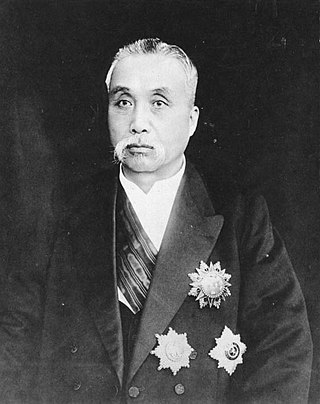The Premier of China is the head of government of the People's Republic of China.
Premier of China may also refer to:
Premier is a title for the head of government in central governments, state governments and local governments of some countries. A second in command to a premier is designated as a deputy premier.

Yuan Shikai was a Chinese general and statesman who served as Prime Minister of the Imperial Cabinet, the second provisional president of the Republic of China, head of the Beiyang government from 1912 to 1916 and Emperor of China from 1915 to 1916. A major political figure during the late Qing dynasty, he spearheaded a number of major modernisation programs and reforms and played a decisive role in securing the abdication of the Xuantong Emperor in 1912, which marked the collapse of the Qing monarchy and the end of imperial rule in China.

The premier of China, officially the premier of the State Council of the People's Republic of China, is the head of government of the People's Republic of China and leader of the State Council. This post was established in 1911 near the end of the Qing dynasty, but the current post dates to 1954, five years after the establishment of the PRC. The premier is the second-highest ranking person in China's political system after the general secretary of the Chinese Communist Party /president, and holds the highest rank in the civil service of the central government.

Xu Shichang was a Chinese politician who served as the President of the Republic of China, in Beijing, from 10 October 1918 to 2 June 1922. The only permanent president of the Beiyang government to be a civilian, his presidency was also the longest of the Warlord Era. Previously, he was Minister of the Cabinet of the Imperial Cabinet during the Qing Dynasty.
The President of China is the ceremonial head of state of the People's Republic of China.
The Government of China is the recognized government of the People's Republic of China;
State Council may refer to:
Office of the President can refer to:
Chancellery is the office of the chancellor, sometimes also referred to as the chancery.
Prime Minister of China, formally named "Premier of China", refers to the head of government of the People's Republic of China.

Lu Zhengxiang was a Chinese diplomat and a Roman Catholic priest and monk. He was twice Premier of the Republic of China and led his country's delegation at the Paris Peace Conference of 1919.
Huan may refer to:
The economic history of China is covered in the following articles:

The Imperial Order of the Double Dragon was an order awarded in the late Qing dynasty.

Gong Xinzhan was a politician at the end of Qing Dynasty and in the early Republic of China. He was a finance expert in the Beijing Government, and was regarded a member of the Anhui clique. He also temporarily served as acting Prime Minister. His courtesy names were Xianzhou (仙洲) and Xiandan (仙丹).
Prime Minister Lee may refer to:

The Prime Minister of the Imperial Cabinet was a position created on 8 May 1911 during the late Qing dynasty, as part of the imperial government's unsuccessful attempts at creating a constitutional monarchy in China.
Premier Li may refer to:
The Imperial Edict of the Abdication of the Qing Emperor was an official decree issued by the Empress Dowager Longyu on behalf of the six-year-old Xuantong Emperor, the last emperor of the Qing dynasty of China, on 12 February 1912, as a response to the Xinhai Revolution. The revolution led to the self-declared independence of 13 southern Chinese provinces and the subsequent peace negotiation between the rest of Qing China and the collective of the southern provinces.